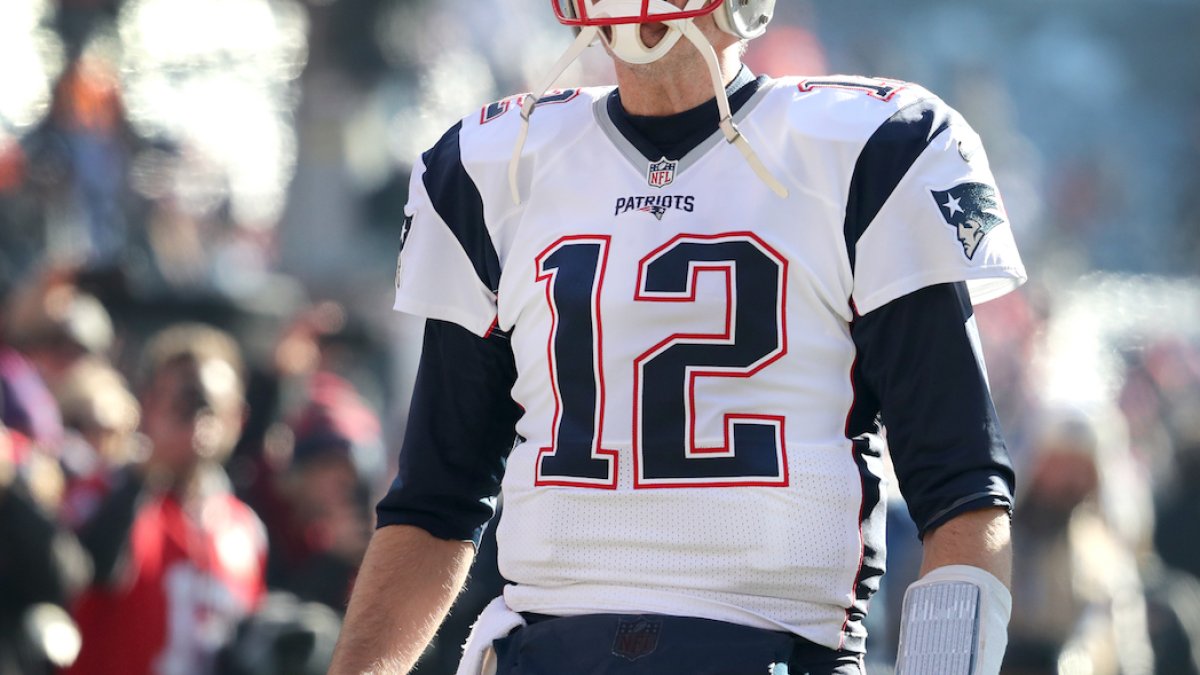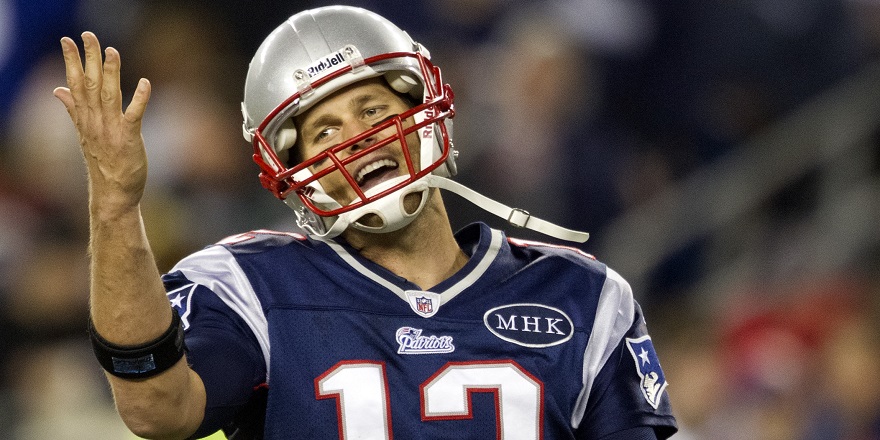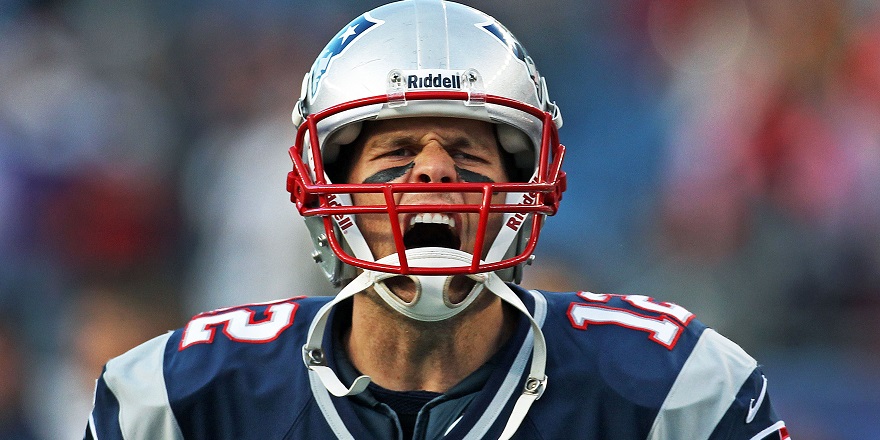Welcome to Narrative Street. This offseason series will explore popular narratives that have infiltrated the fantasy football community.
First stop: Angry Tom Brady. Mostly because he’s playing in Super Bowl LI this weekend, and everyone thinks he’ll be extra angry because of Deflategate.
The narrative: Tom Brady plays better when he’s angry.
The “Angry Brady” narrative is one that I have mostly laughed at over the years. But I did a pseudo study on Angry Brady last summer and determined that it was worth delving into further. So I did.
Before we continue, let me just say that this entire narrative is virtually impossible to conclusively prove or disprove because it’s predicated on an intangible. Also, we aren’t Tom Brady, and we don’t know when he’s actually mad or extra motivated, or why. With that said, it doesn’t take a body language specialist or lip reader to know that this dude gets seriously fired up on Sundays.
Anyway, now that you’re aware that what you’re about to read is far from a perfect science and probably the least statistically sound thing you’ll ever read on Pro Football Focus, let’s get to it.
The “Angry Brady” games
The Angry Brady narrative came to life in 2007. Maybe it existed in some form or another from 2001-2006, but Spygate — followed shortly thereafter by Anthony Smith infamously guaranteeing a win for the Steelers against the undefeated Patriots — is what really brought Angry Brady to the national stage. Ask anyone for an example of an Angry Brady game, and you’re likely to hear of Smith’s guarantee. And for anyone who remembers the game, it seemed obvious Brady was targeting Smith specifically.
So I picked 12 games from 2007 to 2016 in which it was determined before the game that Brady would be angry for one reason or another. Why 12 games? Because it’s obnoxiously painful to search through Google to find evidence that Brady was deemed angry before a game that was played eight years ago. There are tons (seriously) of “Angry Tom Brady wills Patriots to victory” articles — but those don’t count. We can’t decide he was angry after the fact.
There were more than 12 games to choose from, but some of them just seemed silly. For example: An article that said Brady would be extra angry when playing the San Francisco 49ers earlier this year because they passed on him in the 2000 NFL Draft. Yeah, no.
Here are the games I came up with:
| Game | Why was Brady “angry”? |
| 2007 Chargers | First game post-Spygate |
| 2007 Steelers | Anthony Smith’s infamous guarantee |
| 2009 Dolphins (Nov.) | Joey Porter says Brady gets his own rules |
| 2010 AFC Divisional Game | Antonio Cromartie calls Brady a name |
| 2011 Super Bowl | Rematch in SB against Giants |
| 2012 Jets (Oct.) | “Losing his edge” chatter — week after Richard Sherman's “U MAD BRO?” game |
| 2014 Bengals | We're on to Cincinnati |
| 2014 Super Bowl | Super Bowl following initial two weeks of Deflategate |
| 2015 Steelers | First game back from summer Deflategate saga |
| 2015 Cowboys | Greg Hardy makes weird comments about Brady’s wife |
| 2015 Colts | First game against IND after IND reported Deflategate to NFL |
| 2016 Browns | First game back from 4-game Deflategate suspension |
You’ll notice a lot of the games are from the past three seasons. There are two primary reasons: 1) The “Angry Brady” narrative has picked up steam in recent years and 2) Deflategate was a breeding ground.
(Fun fact: The majority of headlines following Richard Sherman’s “U MAD BRO?” tweet simply referred to Sherman as “Seahawks corner” because nobody knew who he was yet.)
Brady’s performances when “angry”
This is the part that surprised me. In my admittedly small sample size of 12 games, Brady’s statistics were undeniably better.
| Atts. | Comps. | Comp. % | Yards | TDs | INTs | Fantasy Pts. | |
| “Angry” Averages | 35 | 26 | 73.3% | 310 | 2.8 | 0.7 | 23.0 |
| 2007-2016 Averages* | 35 | 24 | 68.8% | 285 | 2.2 | 0.6 | 20.4 |
*excludes 2008 when Brady was hurt
He averaged roughly the same number of attempts per game, but completed more passes for more yards and more touchdowns, and, subsequently, scored more fantasy points. He also threw slightly more interceptions per game when “angry.” Keep those emotions in check, Tom.
I also looked at Brady’s positional rank on a week-to-week basis. Given that he’s Tom Brady, he has averaged a phenomenal top-11 fantasy performance every week for the past 10 seasons. But in these 12 “angry” games (excluding playoff contests), he averaged top-six fantasy performances. That’s crazy.
Quotes from the man himself
According to Brady, Angry Brady does exist. But it’s not a here-and-there thing. He’s literally just always mad when playing football. “I'm always sort of frustrated,” he once said. “I've been playing for 15 years, and I'm sort of pissed off about everything.” That quote is from 2014 — three months before Deflategate.
I learned that Brady shaved his beard in 2014 after a Week 1 loss to the Dolphins because he was “pissed off.” That’s the opposite of what fans do. That’s also probably why fans aren’t married to Gisele Bündchen.
Verdict
As an analytics guy, I really don’t feel comfortable typing this, but I’ve come this far, so: “Angry Tom Brady” might actually exist.
My caveat is that I’m not convinced “Not-Angry Tom Brady” also exists. I think he’s just Tom Brady, and he gets more visibly amped up than other players, which feeds the narratives. Plus, he’s old and ornery. He’s said so himself.
I also think a 12-game sample size over a 10-year timespan is not enough to draw any real conclusions. But since I tried to contain this piece to games in which Brady was deemed “angry” before the game started, my options were limited.
If I had included all games in which Brady was deemed “angry” — either before, during or after the game — I would have ended up with a much larger sample size. But I think my approach was most fair, since the retroactive application of “Angry Brady” would likely only happen in games in which he played well, which would skew the numbers in favor of “Angry Brady.”
Just remember that Brady’s average game in our timespan sees him completing nearly 70 percent of his passes for just under 300 yards, while throwing for more than two touchdowns per game and under one interception per game. The far more likely answer is that Tom Brady is just flat-out good, and he was slightly better in games that we decided he was angry for one reason or another — but not necessarily because he was “angry.”
To be sure, the stats I pulled up do suggest that Brady has slightly better numbers when “angry.” But I cannot stress this enough: We don’t actually know if, when or why Brady is “angry,” and even if we did, there’s no way to prove that correlation proves causation here.
I should also note that what I measured is Brady’s fantasy performances in “angry” games — not his on-field performances. If you don’t think there’s a difference, you should go watch Blake Bortles’ 2015 “highlights.”
While I don’t think it’s possible to draw any definitive conclusion here, I can say that at the very least, there’s enough here to keep the Angry Brady narrative alive.





 © 2025 PFF - all rights reserved.
© 2025 PFF - all rights reserved.